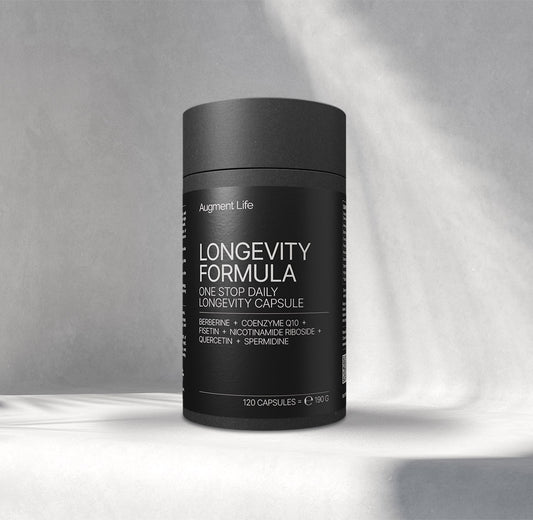In ogni prodotto per la cura della pelle, uno degli ingredienti più comuni in cima alla lista è l'acido ialuronico. Tuttavia, potresti esserti chiesto se questo acido molto popolare è davvero così buono come dicono.
In questo articolo ti forniamo tutto ciò che devi sapere sull'acido ialuronico, i suoi benefici per la pelle per un aspetto più giovane e i suoi effetti collaterali.
Cos'è l'acido ialuronico?
L'acido ialuronico (HA) è un tipo di carboidrato complesso che si trova naturalmente nella pelle, nei tessuti connettivi, negli occhi e nelle articolazioni. Aiuta a dare struttura alla pelle, ripara i tessuti e lubrifica le articolazioni1. In particolare, la pelle è responsabile della quantità più elevata di HA, che è circa il 50% dell'HA2 totale del corpo2.
Un altro ruolo importante dell'AI è quello di idratare la pelle grazie alle sue proprietà di attrazione dell'acqua3. Trattiene le molecole d'acqua sulla superficie della pelle per mantenerla bella e idratata. Tuttavia, invecchiando, la quantità di AI tende a diminuire poiché il nostro corpo non riesce a produrlo in modo efficace come in passato. Ecco perché, con l'età, la nostra pelle può apparire più sottile e secca.
Anche altri fattori contribuiscono al declino dell'HA, come il fumo, i raggi UV e l'inquinamento atmosferico.
Benefici dell'Acido Ialuronico per la Pelle
Idratazione della Pelle
Come accennato sopra, lo scopo principale dell'acido ialuronico è idratare la pelle. Diversi studi hanno dimostrato l'efficacia dell'AI nel migliorare la pelle secca.
In uno studio clinico randomizzato, in doppio cieco, controllato con placebo, è stato scoperto che l'AI ingerito aumentava l'idratazione della pelle e migliorava i risultati del trattamento per i pazienti con pelle secca4.
In un altro studio condotto su partecipanti di sesso femminile, l'uso di AI topico ha mostrato un aumento dell'idratazione della pelle fino al 96% dopo 8 settimane di utilizzo nei diversi tipi5.
Riduzione delle Rughe
Il contenuto di AI nella pelle è considerato correlato ai fattori che causano le rughe. In particolare, la degradazione del collagene e dell'AI da parte dei danni UV causa le rughe6-7.
In uno studio condotto su 60 soggetti giapponesi, le rughe sono risultate significativamente ridotte rispetto al gruppo placebo dopo 8 settimane di assunzione di integratori di acido ialuronico8.
Elasticità della Pelle
L'attrazione dell'acido ialuronico per l'acqua non solo idrata la pelle, ma ne migliora anche l'elasticità. Questo perché l'AI supporta la formazione e il legame di elastina e collagene nel tessuto connettivo e quindi supporta l'elasticità della pelle.
Ciò è stato dimostrato da uno studio condotto su 10 partecipanti di sesso femminile in cui sono stati osservati risultati significativi nell'elasticità della loro pelle dopo 4 settimane di trattamento9.
Guarigione delle Ferite
L'AI è un componente chiave della rigenerazione dei tessuti e della risposta antinfiammatoria. Ecco perché alcune creme per ferite hanno l'acido ialuronico tra i propri ingredienti.
Uno studio di Litwiniuk ha dimostrato che l'acido ialuronico accelera la guarigione delle ferite controllando l'infiammazione e reindirizzando i vasi sanguigni verso le aree di pelle danneggiata10.
Acido Ialuronico - Effetti Collaterali
In genere, l'acido ialuronico è considerato sicuro e non provoca solitamente reazioni avverse. Ciò può essere attribuito al fatto che l'AI è naturalmente presente nel corpo, con conseguente basso rischio di qualsiasi risposta allergica.
Conclusioni
L'acido ialuronico è davvero il Santo Graal della cura della pelle, in quanto offre numerosi benefici alla pelle. È sicuro da usare perché è prodotto naturalmente nel corpo.
Riferimenti
- Mhs, K. L. M. (2020, January 23). L'hype sull'acido ialuronico. Harvard Health.
https://www.health.harvard.edu/blog/the-hype-on-hyaluronic-acid-2020012318653. - Reed RK, Lilja K, Laurent TC. Acido ialuronico nel ratto con particolare riferimento alla pelle. Acta Physiol Scand. 1988;134:405–11 doi: 10.1111/j.1748-1716.1988.tb08508.x.
- Masson F. (2010). Acide hyaluronique et hydratation cutanée [Skin hydration and hyaluronic acid]. Annales de dermatologie et de venereologie, 137 Suppl 1, S23–S25. https://doi.org/10.1016/S0151-9638(10)70005-3
- Kawada C, Yoshida T, Yoshida H, et al. L'acido ialuronico ingerito idrata la pelle secca. Nutrition Journal. 2014;13(1). doi:10.1186/1475-2891-13-70
- 5. Jegasothy, S. M., Zabolotniaia, V., & Bielfeldt, S. (2014). Efficacia di un nuovo acido nano-ialuronico topico negli esseri umani. The Journal of clinical and aesthetic dermatology, 7(3), 27–29 Efficacy of a New Topical Nano-hyaluronic Acid in Humans.
- Fisher GJ, Wang ZQ, Datta SC, Varani J, Kang S, Voorhees JJ. Fisiopatologia dell'invecchiamento precoce della pelle indotto dalla luce ultravioletta. N Engl J Med. 1997;337(20):1419–1428 https://pubmed.ncbi.nlm.nih.gov/9358139/.
- Dai G, Freudenberger T, Zipper P, et al. L'irradiazione cronica ultravioletta B causa la perdita di acido ialuronico dal derma del topo a causa della down-regulation delle sintasi dell'acido ialuronico. Am J Pathol. 2007;171(5):1451–1461 https://pubmed.ncbi.nlm.nih.gov/17982124/.
- Oe, M., Sakai, S., Yoshida, H., Okado, N., Kaneda, H., Masuda, Y., & Urushibata, O. (2017). L'acido ialuronico per via orale allevia le rughe: uno studio in doppio cieco controllato con placebo su un periodo di 12 settimane. Clinical, cosmetic and investigational dermatology, 10, 267–273 https://doi.org/10.2147/CCID.S141845.
- Heusler, H. (2015). Efficacia di un gel di acido ialuronico per migliorare le proprietà della pelle. SOFW Journal, 141, 16–18. https://www.experchem.com/files/news/attachment/72c3f4f4-0c1b-4d05-ae74-29f3d9b8c196/0915-PDF-Expertchem-Haeusler-E-200dpi.pdf.
- Litwiniuk, M., et al. (2016). Acido ialuronico nell'infiammazione e nella rigenerazione dei tessuti https://www.woundsresearch.com/article/hyaluronic-acid-inflammation-and-tissue-regeneration.








